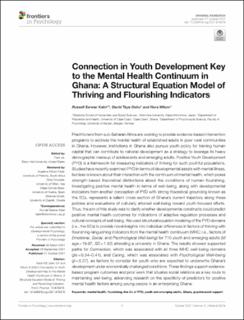| dc.description.abstract | Practitioners from sub-Saharan Africa are working to provide evidence-based intervention programs to address the mental health of established adults in poor rural communities in Ghana. However, institutions in Ghana also pursue youth policy for training human capital that can contribute to national development as a strategy to leverage its heavy demographic makeup of adolescents and emerging adults. Positive Youth Development (PYD) is a framework for measuring indicators of thriving for such youthful populations. Studies have recently examined PYD in terms of developmental assets with mental illness, but less is known about their interaction with the continuum of mental health, which poses strength-based theoretical distinctions about the conditions of human flourishing. Investigating positive mental health in terms of well-being, along with developmental indicators from another conception of PYD with strong theoretical grounding known as the 5Cs, represents a salient cross-section of Ghana’s current trajectory along these policies and evaluations of culturally attuned well-being toward youth-focused efforts. Thus, the aim of this study was to clarify whether developmental constructs could predict positive mental health outcomes for indications of adaptive regulation processes and cultural concepts of well-being. We used structural equation modeling of the PYD domains (i.e., the 5Cs) to provide novel insights into individual differences in factors of thriving with flourishing-languishing indicators from the mental health continuum (MHC; i.e., factors of Emotional, Social, and Psychological Well-being) for 710 youth and emerging adults (M age=19.97, SD=1.93) attending a university in Ghana. The results showed supported paths for Connection, which was associated with all three MHC well-being domains (βs=0.34–0.41), and Caring, which was associated with Psychological Well-being (β=0.27), as factors to consider for youth who are expected to underwrite Ghana’s development under economically challenged conditions. These findings support evidence-based program outcomes and prior work that situates social relations as a key route to maintaining well-being, advancing research on the specificity of predictors for positive mental health factors among young people in an enterprising Ghana. | en_US |

